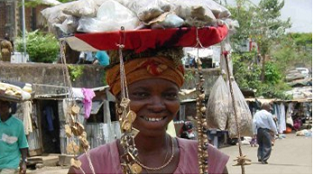Resource information
[From allAfrica] Freetown — Shortly after her father died, Sia Bona's husband's family took over her father's oil-palm plantation and rice paddies, and drove her and her mother from their home. "I came from riches, but now I am poor," said the 45-year-old teacher from Koidu town in eastern Sierra Leone.
Like many African countries, Sierra Leone has a dual land tenure system, with aspects from the colonial era and customary ownership varying in proportion, depending on location. This creates confusion regarding land rights for women, says Catherine Gatundu, natural resource rights coordinator at NGO ActionAid International.
The 2007 Devolution of Estate Act criminalizes depriving a woman from inheriting her husband's property after his death. It recognizes customary marriage, the rights of polygamous spouses, and imposes penalties for evicting a spouse or child from the marital home.
The inheritance should be shared among surviving family, with 35 percent going to the spouse, 35 percent to the children, 15 percent to parents and 15 percent in line with any customary laws.
But the act only recognizes an individual's right to land, not a family's, and the vast majority of Sierra Leonean women live under traditional land tenure structures that do not recognize a woman's right to own property.
While statutory law governs the capital, Freetown, and its surroundings, customary law - under the heads of ruling families known as paramount chiefs - governs the provinces.? Paramount chiefs, who are the "custodians of the land", are allocate it to individuals or families, are generally men and most ethnic groups do not allow women to inherit land and property.
Customary law applies in 12 of Sierra Leone's 14 districts.
As the government looks to reform land policy ahead of presidential elections in November, gender activists are pushing to make women's right to land a reality, calling the current set-up "discriminatory".
"The land tenure system in the rural areas actually affects women the most," said Gladys Brima, the founder of Women's Partnership for Justice and Peace, a local non-profit organization. "Women use the land more. But when it comes to ownership, women do not own the land."
For the full article visit https://allafrica.com/stories/201206220891.html

